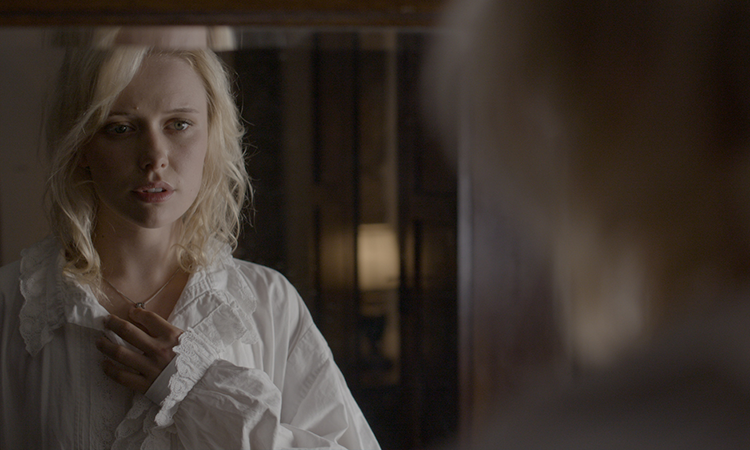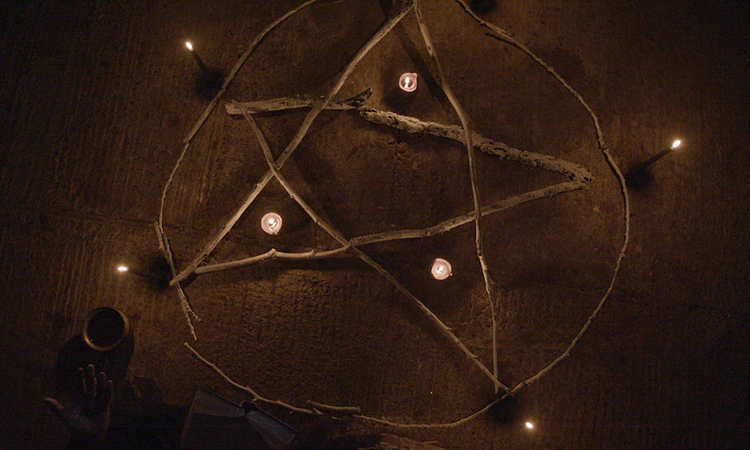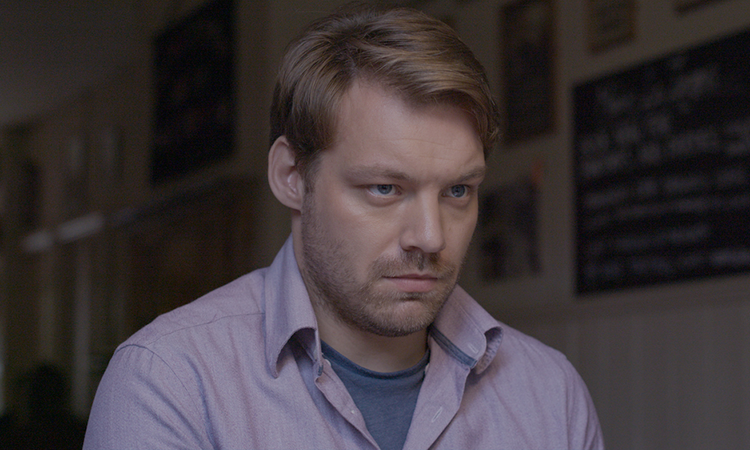Set both in the past and in the present, The Darkness sees a young couple whose escape to Ireland soon turns into a discovery of long-forgotten crimes and a battle against possession, witches and demons.
The film follows writer Lisa (Amelia Eve, The Haunting Of Bly Manor) and entrepreneur David (Cyril Blake, The Waiting Game) who take up residence in an old remote home in Ballyvadlea, Ireland after needing an escape from their hectic London lives.
However, after discovering a memoir of a woman called Niav (Katherine Hartshorne, Happiest Day) the couple soon discover the house’s murky past and unintentionally unlock long closed doors which has awoken a dormant evil spirit…
We spoke to The Darkness’ writer, director and producer Tharun Mohan about his love of horror and the challenges of finding an axe in the middle of shooting…
When did you first come up with the idea for The Darkness?
Basically, I love horror! I enjoy gore but I love anything that’s a bit more supernatural/thriller-ish and I love the idea of having ghosts around. But changelings… I wasn’t aware of this idea until about 2008/7 I think [when] an Irish lady told me about the concept of changelings. It was quite intriguing and the concept of changelings stuck in my head – the idea of someone possessing someone or taking away someone and replacing it with somebody.
I’ve read many different things about it, mostly everything that’s coming from Ireland who heavily believe in this concept of changelings. When people have a change of behaviour, they used to blame changelings. It could be some kind of mental illness [but] people would be saying ‘oh, it’s the work of changelings’. So that’s how the idea stuck with me. I [also] love anything that’s kind of involving revenge, deception, demons and witchcraft so I was trying to put all of these things together!
The Darkness started off as a short film, how did it go on to be made into a feature film?
Originally I had a different idea for making my first feature film but it had a lot more budget to it and I don’t want to kill it. Then I wanted to make something light, but at the same time, I like to incorporate some of the period stuff. I didn’t want to do something easy; adding some period stuff makes it more interesting, plus I had access to the location.
One of the key things to writing something period is you have to spend a lot of money. So I needed to find a house in England which had all of the period elements preserved. I probably scouted for like a month while still writing the script and I found this house called Repton Manor which had everything period including the windows and the doors.
That’s how The Darkness was born reallly – I wanted to make something that was kind of close to my heart, but at the same time I could be a bit experimental.
The Darkness was originally called ‘Dorcha’. What does Dorcha that mean and why did you choose that original title?
‘Dorcha’ just means darkness in Irish Gaelic. That’s what the movie is about. It’s just the darkness in someone’s corner. Whether it’s him or her, it doesn’t matter but that little bit of darkness is what the movie’s exploring and that’s where the movie ends at the same time…
What would you say are the key themes in the movie?
Even though it’s about a changeling, it’s [also about] the far greater, darker, deeper thing that runs around the movie and it’s not obvious until towards the end. Then everything that revolves around it is the myths. Like the witchcraft, or the demon, or the inquisitors …
It’s [also] a female-centric film. It is about women – whatever bad happened to somebody 100 years ago, it shouldn’t happen again! I think that’s the darker root theme of the film. Yes, it is horror, but that’s the actual theme of the film.
I call it a Bombay Mix! Everything’s in it, that I can think of [haha].

Are the folktales in The Darkness based on real stories?
There’s this famous story [about] Bridget Cleary, who died in Ireland in probably the early 19th century who, from the story that I’ve read, is basically this wonderful woman, this independent woman who was becoming a bit too independent and her husband didn’t really like it.
She was a tailor, I think, and she was tailoring her own beautiful skirts, and then she was actually making more money than her husband. Which back then wasn’t something they could comprehend and then her husband ended up killing her! He set her on fire in a very ritualistic fashion. The husband blamed it on the changeling and said that she was possessed. I wouldn’t say he just blamed her, he actually thought she was being possessed by a changeling.
It’s pretty freaky. I read every different source that I can get of the story and that kind of contributed in a different way to the film.
Were there any other inspirations you looked to when making the movie?
There’s quite a few actually. I’m a big fan of Spanish horror movies in general and I also like J horror. The Japanese make amazing, crazy stuff.
The Orphanage/El orfanato must be one of my favourite horror movies of all time. It’s creepy plus it builds the atmosphere. It makes you think one way and then it scares you another [way]. I want to make something like that. I love the idea of making people think rather than just cheap scares. I want people to watch it, be scared and then remember it and have nightmares about it!
What do you think it is about horror that appeals to you?
I think horror is the same as religion really isn’t it? The fear of the unknown. If you know there is somebody out there who can control you and make you do things or make you see things and that’s the most amazing thing ever.
It’s like a pill or something that changes your reality altogether. I think that’s everybody loves or hates horror for that same reason. It’s because you don’t know what you’re stepping into. If you’re watching a rom-com, you know it’ll be a happy ending. If it’s a sad movie, you’ll probably see a sad ending. If it’s a historical movie, you know exactly what’s going to happen, it’s history. It happened.
But when it comes to horror, you walk into that cinema, into a dark room or you’re on your own, you don’t know what you’re stepping into… I think it’s that notion of the unknown that really captivates people, not knowing is amazing.

What was your biggest challenge when shooting the movie?
Because we didn’t shoot it chronologically, our biggest challenge was changing the same house into both period and current [settings]. We had different rooms: one was dressed for period, the other dressed for current. So probably the biggest challenge was restricting ourselves within the same house and splitting the house into two!
We had to work a lot with the AD, Katie [Hartnoll], she’s amazing. Having a schedule that fits into what you have access to and the time you have access to it, the people we have access to it was probably the trickiest bit. [But] once we’d pin that down it worked very well and almost every day we wrapped on time!
Were there any surprises you encountered when filming?
Many! You know, the good thing about low-budget films is they’re full of surprises! There’s a scene in the trailer where Brian chops the wood with an axe and everything was on the list. We had all the props and everything but on that day of filming, we didn’t have an axe for some strange reason! Blame it on me, it probably wasn’t on my checklist. So I had to send my producer (who’s also my missus) to go find an axe. She had to knock on random doors and ask if they had an axe. Then she found one… they didn’t even ask why, they just gave her an axe. We filmed everything and she went and gave the axe back and he said: “I probably shouldn’t have given it to you. I didn’t even ask you who you are or why you need this axe!”
That was one of funniest things where I remember. She came back running back waving the axe: “I found it, I found it!! and bang, that shot ended up in the trailer!
You wrote, directed and produced The Dakrness. Which was the most challenging role and which did you like the most?
The hardest is producing. I really hate it in all honesty, but then when you have a shoestring budget the best person to control it is yourself. I think it worked, but I am not going to produce anything ever again!
There was [also] some VFX that I had to do myself because we realised we were running out of budget. So there are some things I had to train myself to do but also I got great help from great people’s in the VFX industry.
Probably the one thing I really enjoyed, apart from directing, must be casting. It was really fun to work with some of these agencies and then get the cast right. I’m really proud of the cast as well. They’re really good.
Speaking of which… how was it casting the movie?
There was a surprise on that one as well. When I wrote this, I had some idea, not necessarily how they’re going to look, but how they will behave. So when we did the casting a lot of replies came in, which is really great. For the main three characters like Lisa (Amelia Eve), Niav (Katherine Hartshorne), and Brian (Adam Bond) I knew straight away the people who we were going to get [the role] when I looked at the self tape and then when I auditioned them, I was even happier, so that worked well.
But at the same time, sadly the original [actor] for Dave (who is played by Cyril Blake [in the film]) had to back out two days before the shoot for some unforeseen reason! You can’t really help when such a thing happenes. So we had to go for the second best option and I’m glad we did. It worked well.
I think that was one of the daunting surprises, when you have a schedule and then we change the schedule… the first day we only shot with Amelia Eve, [but] that also helped because she got a really good idea [of the movie]. She was the only actor that day so that worked well.

What do you want audiences to take away from the movie?
Love horror! That might be the best thing to say. Embrace it for what it is. Don’t be afraid of it. Watch it. I think the best thing about horror is you can do whatever you want with it because it didn’t happen. It could be anything. You can have your own logic and your own ideas around it. So probably, the one thing I want people to take away is ‘watch more horror films’ and don’t mess with anybody… they could come back as a demon and haunt you later.
What’s coming up next for you?
There is one thing that’s close to my heart, it’s also my first short film I ever did back in 2015. It’s about this zombie baby… It’s not really a zombie baby, it’s a creature of some sort, who lives in a woman’s womb, like a parasite and comes out and attacks people and then goes back inside. It stays inside a woman, she’s the host and then it’s her job to let it out when the thing is hungry.
So that’s something I made a short film out of and currently, I’m writing a feature on it. It’s halfway through, and I’m really excited for it. There are some people who are interested in making that happen. Since the pandemic it’s kind of slowed down, really it’s like I’m back to the drawing board, but that has helped so I can redo the script. So that’s, that’s coming up, which I’m really, really excited for.
It sounds a bit like Rosemary’s Baby…
I love Rosemary’s Baby! I think that must be the main inspiration for the idea. I’m scared of children. They’re lovely and adorable for the first ten minutes and then they turn creepy. They could be changelings… you don’t know [haha]!
The Darkness is out now on digital platforms.
